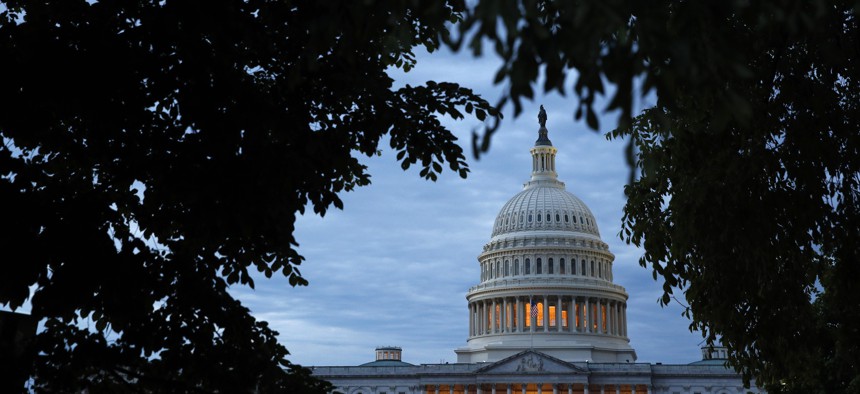House Democrats’ Coronavirus Aid Plan Would Distribute County, City Funding by Population

Light shines from inside the U.S. Capitol dome at dusk on Capitol Hill in Washington, Sunday, May 3, 2020. AP Photo/Patrick Semansky
Democrats want to include funding for local governments in their latest proposal, but are expected to meet resistance from Republican lawmakers.
Democrats on Capitol Hill are beginning to lay out the terms of their plan to distribute more coronavirus aid to city and county governments, even as Republicans have voiced reluctance to do so in the next federal relief package.
House Democrats are expected to release their proposal by the week’s end, which will include formula funding for county and municipal governments, according to a letter sent Monday by the Appropriations Committee chairwoman.
All counties would be allotted funding based on population, according to the letter sent from Rep. Nita Lowey to colleagues. Funding for cities would be divided so that those with populations over 50,000 would receive 70% of the allotted funding and those with fewer than 50,000 people would receive the remaining 30%. Money would be distributed to cities with more than 50,000 people using a modified Community Development Block Grant formula, and the remaining funding for small cities would be based on population.
“While Republicans blocked state and local assistance in the interim package, inclusion of funding to pay the essential state and local workers who keep us safe and keep our communities functioning is the top priority for Democrats in the next phase of legislation,” said a spokesman for Rep. Lowey.
Providing additional funding for state and local governments, which are expected to face severe budget shortfalls due to a decline in revenues, has become a partisan battle line on Capitol Hill.
House Speaker Nancy Pelosi has raised the possibility of providing another $500 billion for state governments and an equally large sum for local governments.
But Senate Majority Leader Mitch McConnell and other Republicans have voiced reluctance about moving quickly to provide huge sums of additional, flexible funding for states and local governments. Congress has already approved nearly $3 trillion in coronavirus-related assistance.
While the House remains out of session, the Senate reconvened this week in a bid to try and set the terms of the debate over the next aid package. In a speech on the Senate floor Tuesday, McConnell said the next aid package must include liability protections to shield companies and health care workers from coronavirus-related lawsuits.
“We won’t let our historic recovery efforts be diverted so that taxpayers foot the bill for the biggest trial-lawyer bonanza in our history,” he said.
President Trump also railed against providing additional money to states this week, even though he previously signaled he would be open to allowing states to use funding to offset their revenue losses.
“Well run States should not be bailing out poorly run States, using CoronaVirus as the excuse!” Trump tweeted Tuesday.
Governors, along with county and municipal government associations, have pushed federal lawmakers to include more money for their governments in coronavirus aid packages, citing both the costs of the public health response and the ongoing economic crisis. A recent survey of local government officials found that 88% expect a budget shortfall this year and about half expect their cities will have to cut public services as a result.
The National Association of Counties estimates that county budgets could be reduced by at least $144 billion due to the pandemic. The National Governors’ Association has asked Congress to provide an additional $500 billion to states and territories to help them with budget shortfalls related to the pandemic.
NACO Executive Director Matthew Chase said the House proposal would help local governments meet the rising costs associated with the pandemic.
“Counties are on the front lines of addressing the far-reaching health, safety and economic consequences of COVID-19,” Chase said. “We urge the administration and Congress to unite in supporting relief efforts on the ground.”
Andrea Noble is a staff correspondent for Route Fifty.
NEXT STORY: The Small-Business Die-Off Is Here





